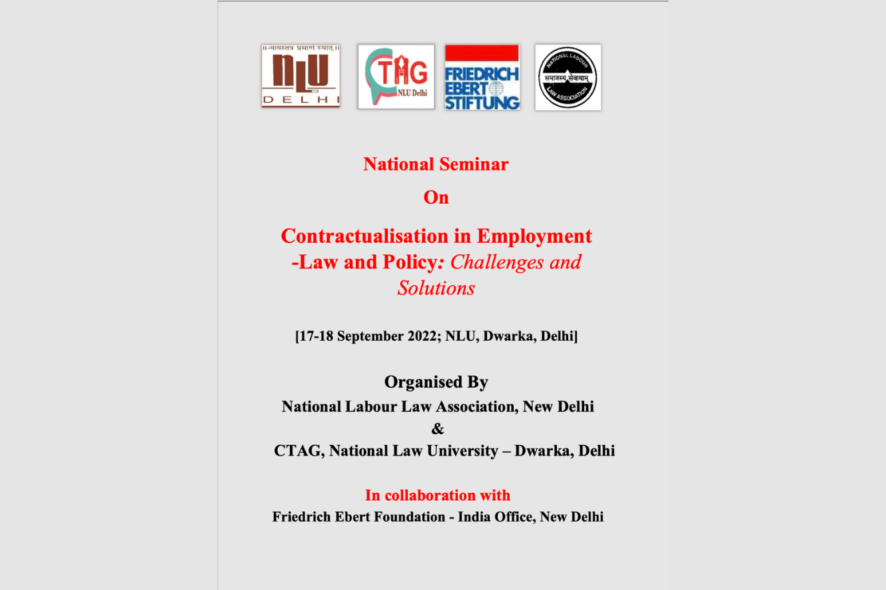The National Labour Law Association, Delhi and the Centre for Transparency and Accountability in Governance, NLU Delhi in collaboration with the Friedrich Ebert Foundation (India Office) are organising the National Seminar on Contractualisation in Employment — Law and Policy : Challenges and Solution from 17-18 September at the National Law University Delhi.
About the Seminar
The Corporates, pursuant to globalization and inherent competition, have generally been adopting Labour rationalization policies in order to reduce costs to be competitive. In pursuance of the same, several developed and developing countries have introduced plans like Voluntary Retirement Scheme (VRS), lay-offs/retrenchment, and closures both in the organized and the unorganized sectors. A significant shift has taken place in the sector from permanent to temporary, casual workers and now towards fixed-term contract employment. This has weakened the collective bargaining machinery. Instances are not lacking where permanent workers, including those from non-core activities, are removed and replaced by contractual workers through outsourcing to other firms or direct recruitment.
Further, some States in India have exempted several small establishments from the purview of labour inspection. On the other hand, some employers have even offered lower wages to the workforce as a condition for reopening closed industries. Workers have been accepting such exploitative offers in the background of the non-existent social protection. Moreover, under the WTO regime, labour and economic policies seem to result in the closure or disappearance of many companies, especially those engaged in consumer goods. The major issue that emerges is how the industrial units which are sick or closed or under liquidation due to the worldwide economic crisis would be facilitated.
The COVID19 pandemic has caused major havoc worldwide, including in India. The worst effect has been on the workers who have lost their jobs and other means of livelihood. In addition to this, the shrinking of national economies, declining trade, increasing inflations have created a humanitarian crisis in many parts of the world. Can the reform in laws and political posturing alone bring the economies out of the present crisis? Do we need to think of a new form of Social Contract?
The Seminar will deliberate on the contemporary issues relating to the contractualisation of the workforce – policy and the law. In this context, an attempt would be made to draw lessons from the best practices followed in other jurisdictions.
The following sub-themes will be discussed —
-
Fixed Term Employment
-
Contractual employment or Perennial work: Labour – Law and Policies
-
Legal Protection to contractual workers: Social Security etc
-
Inter-State Migrant workers and their rights
-
Gig- workers-and Platform workers
-
Regularization of contractual workers: Judicial trends
-
Industrial development and contratualisation of workforce
-
State policy on contratualisation of work
-
ILO and other agencies on contractual employment
-
Tripartism and social dialogue
-
Law and policies on Contractual employment in other nations
-
Labour Law Reforms and Contractualisation of workers
Guidelines for Seminar Papers
The Authors should apply research skills and appropriate research methodology. The research paper should be thematic and desired to be linked to the sub-themes. The length of the abstract should not be more than 500 words. It must be typed in Times New Roman, Font Size 12 on A4 size paper with 1″ margin on all sides with 1.5 line spacing using MS Word application. Footnotes should follow the SILC standard of footnoting. Endnotes are not allowed. At the end of the paper, the author’s brief profile should have an E-mail ID, contact number, and address.
|
Abstract Submission along with board headings and subheadings of the research papers |
4th September 2022 |
|
Approved Abstracts notification |
6th September 2022 |
Registration Guidelines
The research paper should be submitted to the Convener of the Seminar at ctag@nludelhi.ac.in. Articles received after the stipulated deadline will not be entertained for inclusion in the Seminar. Professionals/Teachers/Students may participate in the Seminar without submitting any research paper by paying the requisite charges.
Participation and Registration Fee —
1. Registration Teachers/Professionals : Rs. 2000
2. Registration for Research Scholars, Students: Rs. 1000
Online Payment Details – https://rzp.io/l/LKMeyIGR2s
Please note that accommodation will not be provided.
For more details, refer National Seminar on Contractualisation
For any queries, please contact the Seminar Convenor, Prof. Jeet Singh Mann, Director, CTAG NLU Delhi at ctag@nludelhi.ac.in.







